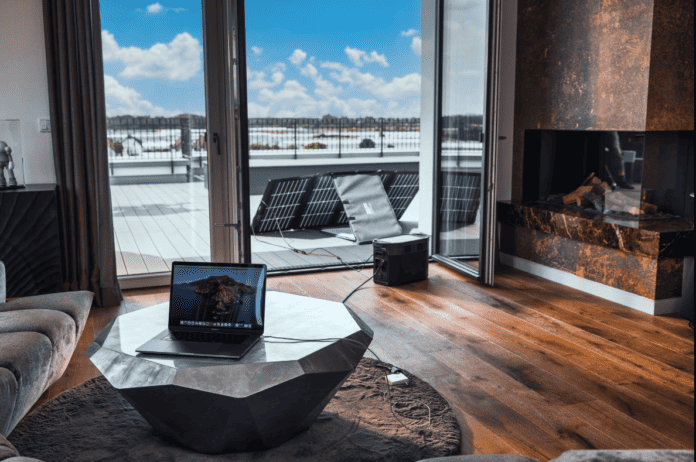Table of Contents
With all the load-shedding in South Africa—the worst year on record in 2023 with 332 days of rolling blackouts—it’s no wonder off-grid solar systems are becoming increasingly popular. On-grid systems are designed to shut off for safety during a blackout, meaning they won’t work when you need them the most. We’ll review everything you need to produce your own off-grid energy so you don’t have to worry about load-shedding ever again.
Let’s get started.
What Components Are Needed for an Off-Grid Solar System?
An off-grid system isn’t tied to the public utility grid, so it’s entirely unaffected by load shedding. This differs from on-grid, which uses the grid as a backup in case your energy needs exceed your production. This works for those without enough photovoltaics to supply their needs. However, on-grid systems shut down during load shedding, which is a severe problem with Eskom’s constant blackouts.
Going completely off-grid can easily be done with some planning and the right equipment. Fortunately, portable power stations like EcoFlow DELTA Pro have all the Balance of System (BOS) components built into one compact, easy-to-use unit.
These include the inverter, battery, charge controller, and battery management system. Simply add solar panels, and you have power. Alternatively, you can buy a solar generator that comes with panels, like the EcoFlow DELTA 2 Solar Generator with a 220W Bifacial Portable Solar Panel. Let’s explore the essential components to make the switch to photovoltaic energy super easy.
Solar Panels
Photovoltaic panels (PV) are where the magic happens. They harness photons from the sun, generating electrons that are converted into direct current (DC) energy that flows into the inverter.
Solar Inverter
The inverter converts the DC electricity produced in the PVs into AC (alternating current) electricity, like used in your home. These are built into EcoFlow’s Portable Power Stations (PPS) as part of the essential BOS.
Solar Battery
Batteries store the energy your PVs produce so you can have power at night when your panels aren’t generating any. These are part of EcoFlow’s PPS and are made with new, safe and reliable LiFePO4 batteries. They’re also expandable with the ability to purchase additional batteries to suit your needs, up to 25 kWh.
Your electricity usage will help you decide how much energy you need to go off-grid. You should buy more than enough capacity for your home’s needs to account for higher consumption days and poor weather when your panels can’t work at maximum capacity.
Solar Charge Controller
This component regulates the voltage and current from the PVs going into the battery to optimise battery performance and prevent over and undercharging. This is also built into the BOS in a quality PPS.
Battery Management System
The battery management system is the final component of the BOS. It maximises battery performance and enhances its lifespan to ensure your LiFePO4 batteries last as long as possible, at least 10 years.
Transfer Switch or Smart Home Panel
A transfer switch allows you to remain grid-tied but transfers you to your photovoltaic backup if the grid goes down so fast that you will hardly even notice the grid isn’t running. This is essential in South Africa if you want to remain tied to the grid but not have to deal with blackouts.
A Smart Home Panel is an optional component that can be integrated into your home’s existing electrical system. It allows you to easily control, manage, and monitor your home’s energy usage, whether you’re on or off the grid.
Mounting Hardware
Mounting hardware is needed for permanent installations on roofs or the ground. It secures modules like EcoFlow 400W Rigid Panels in place. Portable panels don’t require mounting hardware because they are intended to be moved around.
Wiring and Cables
Of course, wiring and cables are necessary. Some of these will come with your PVs and PPS, but depending on your home’s electricity, you may need to purchase a few additional components.
What Should Influence Your Off-Grid Solar System Design?
Energy Requirements
Calculating your energy needs will determine the size and number of batteries you need and the number of PV modules you need to charge them.
Size & Pitch of Your Roof
The size of your roof will determine how many panels you can install. The pitch or angle of the roof is also important since it will impact the maximum energy efficiency of your PVs and must be considered when designing your system.
Budget
The cost of an off-grid system can vary significantly, depending on your energy needs. For a basic portable unit for off-grid safaris or game drives, the EcoFlow RIVER 2 Solar generator with 110W PV is R9,999.00. A more robust solar generator to run your home, like an EcoFlow DELTA Pro solar generator with two 400W rigid PV panels and 3.6kWh storage (expandable to 25kWh), will cost you R67,999.
Businesses can deduct photovoltaics from their taxes, but homeowners no longer can since the brief solar tax incentive ended. However, it’s still an excellent investment because an off-grid system will pay for itself in five years, called the solar payback period. Not only will you be free of Eskom’s load-shedding, but after 5 years, your energy will be free for at least 20 more years.
Frequently Asked Questions
To go completely off-grid, you will need a battery, inverter, charge controller, and battery management system, all of which are built into quality portable power stations. Additionally, you will need photovoltaic panels, wiring, mounting hardware, and an optional Smart Home Panel.
Final Thoughts
Now you understand the basic components needed for an off-grid photovoltaic system so you can be self-sufficient and free yourself from worrying about load-shedding ever again. With one of EcoFlow’s Solar Generators, you can do just that. Our generators provide all the necessary components to have power when and where you need it, on your terms, instead of your utility company’s.
